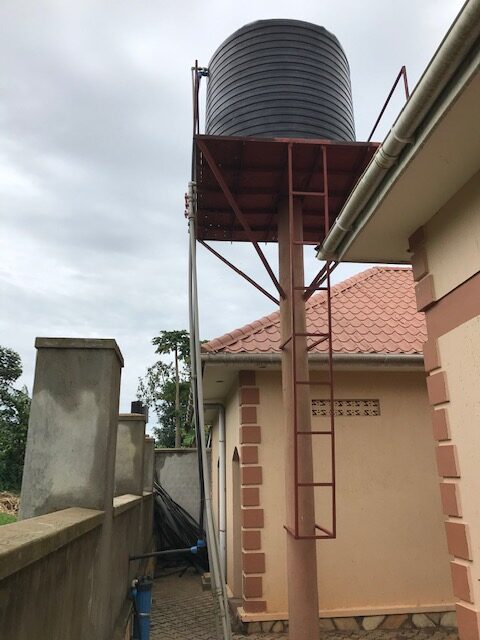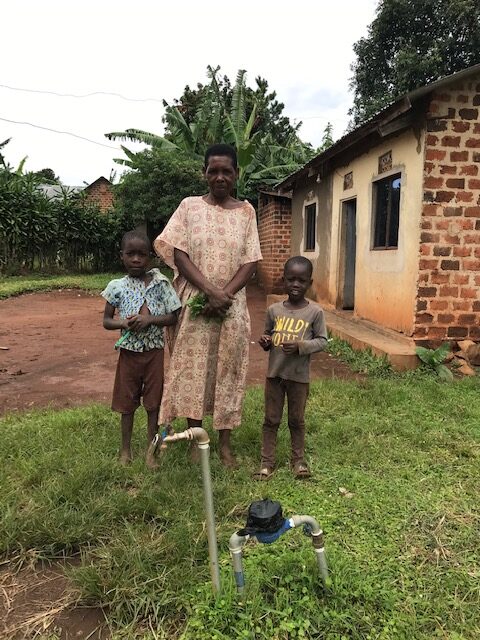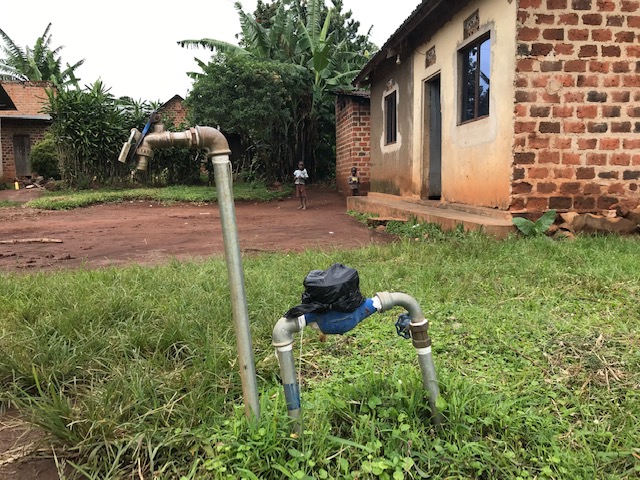This water tank is one of two above-ground water tanks that can be found at Nkuru Vocational Community College in rural Mityana district, Uganda.

They are filled in part by water that is pumped up from a borehole owned by the college and situated about 600m down the hill. And they are also filled by water that has been gathered from rainwater harvesting. This harvested water goes first into a massive underground tank, and is then pumped up into the high-level tanks as needed. So in the rainy season, the rainwater will be the primary source of water into the upper tanks, giving the borehole a chance to recover its water levels. And in the drier season, when rainwater harvesting is less, the borehole can ensure that the supply of water keeps going.
The water is used to serve the needs of the college, including the facilities for the boarders, the hair salon, the café kitchen, and general daily needs. And for some colleges it might stop there – use the water just to ensure the college is always adequately supplied.
But for this college, which has community engraved at the heart of all it does, the water project goes so much further.
Access to safe, clean water has always been an issue for poor rural communities across the world, and it is no different in Uganda. Those tasked with collecting the water – usually women and children – can walk for an hour or more to reach a reliable source, and then might have to stand in line for another hour until it is their turn to fill up. As a result, the children could be late for school, resulting in beatings and punishment, or even being sent home due to poor attendance. And for the girls there is the additional danger of their vulnerability to abuse and rape whilst out collecting water in remote places. At the other end of the age-range, many grandparents find themselves looking after their grandchildren whilst the parents go to the city to try and find work. For these elderly folk, the burden of having to fetch water for the young children, as well as carrying out all the other chores that are increased due to having extra mouths to feed can become a great strain. Mary is one such lady – grandmother to Emma and Eddy, she is their sole carer now, and the additional water that she had to fetch for them was becoming a great strain on her body.

So, the decision of the college to share its water resource with others in the community has come as wonderful and welcome news. Twenty eight households have had pipes laid to their homes, and taps with water meters installed. The households were chosen in part through their willingness to assist with the cost of laying the pipes (they were laid by students, so no labour costs, just the cost of materials), and or based on needs. So some of the recipient households are those who are particularly vulnerable.
Each household has to pay for the water that it uses, and this is calculated thanks to the water meter. Some of the households just keep the water for their own use and enjoy the additional time that they have for other chores, or to get to school on time. Others have started small income generating businesses selling water to their neighbours. Some have used the water to improve their poultry businesses and are seeing an increased number of eggs being laid due to better water supply for the hens. One lady is using it to increase irrigation to her coffee growing business, and has seen an improvement in the crop yield which is gaining her a better price at market.

However the family choose to use the water – it is improving their lives, and the lives of their neighbours in some way, and for the college, that knowledge is reason enough to confirm that their original decision to set up the project was the right one.




